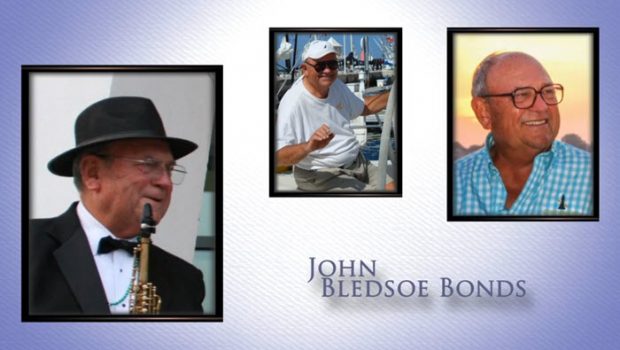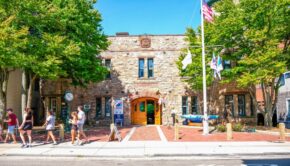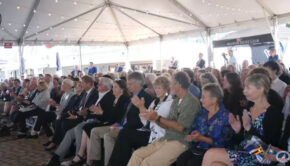John Bonds: Having fun with sailing
Published on November 19th, 2019
Since its launch in 2011, the National Hall of Fame has enshrined 81 heroes of the sport, with its induction ceremonies offering an opportunity to witness these outstanding individuals. The Class of 2019 was the ninth such occasion, with John Bonds among the latest inductees.
Receiving the award for John, who passed away in 2010, was his children Margaret Podlich and John Bonds, Jr. Here was their acceptance speech:
John Bonds, Jr.:
Thank you selection committee, and thank you Hall of Fame. It is quite an honor and quite a shock, and I want to start by saying that Dad was a huge admirer of all the achievements of the members of the Hall of Fame. So thank you for recognizing and thinking his contributions to the sport were important.
Dad was a very pragmatic, straight ahead, no nonsense guy who had fun in everything he did. And every decision he made that had any relevance to anything, he thought anybody in their right mind would have done the same way at the same time. And those of you that knew him, knew that he had fun from the moment he woke up to the moment he went to bed every night.
And he thought sailing was fun. He thought anything having to do with sailing was fun. I think he was right. He thought sailing was fun based on early experience sailing, probably a Styrofoam Sea Snark on a lake in Arkansas. It’s like, “This is fun.” Everything’s relative.
He decided as a budding jazz musician that maybe a career in the Navy was a better idea, and he determined that going to sea was definitely fun. He had fun every time he got underway on anything, and thought that everybody else should, too. And anyone that’s ever spent time with him on the water saw that, and he made everybody else have fun because, what else would you do out there?
He came to sailing relatively late in his life, at 16 years, and he just wanted to spread what he thought was a great idea. So when US Sailing asked him to come, truncate what he thought was going to be a 30 year Navy career to come help the sport, it sounded like fun. So off he went, and he continued doing things that he thought other people should do if they had the same opportunities. So thank you for recognizing what some of those things were.
Margaret Podlich:
We were talking last night with my mom, Beth Bonds, who’s here, and on this theme of fun and sailing, remembering that when we were like maybe 10 and 12, we raced as a family up in Rhode Island, and we had a procedure on the boat where John, who was probably 82 pounds dripping wet at the time, was hoisting the spinnaker halyard, and Mom had to remember not to trim the spinnaker sheet, otherwise John would be launched to the spreaders.
I think that’s an interesting theme with Dad, because he loved racing, but he also loved deliveries, he loved practicing, he loved the entire sport, and not just between the start and finish line. And he loved helping others discover that, to the extent that he chose to sail and race with his family as long as he could until we left the nest. And we were up against pro crews, quite honestly. He chose to buy this crazy new boat called the J/24 when we were teenagers, because he wanted us to continue to want to sail together instead of going and playing tennis or horseback or whatever.
And he loved sharing the sport of sailing and the joy of sailing, that joy that we all get whether reaching on a Laser, or just the sheer escapism of it, to the extent that, when he was in the Navy, and on an ammunitions ship, there were not welcome at the docks in foreign ports for obvious reasons, so they had to anchor out and dad was determined to have sailing.
To provide a recreation for the kids on the boat, he contacted Laser and Windsurfer and got truckloads sent in. He made a dock that he loaded from the ship down to the water, and basically created his own arena for his sailors and taught them how to sail. So that teaching element, that joy element, continued.
John Bonds, Jr.:
In the 70s, the Navy had no money for fuel, there was fuel crisis, it was expensive, and they welded, technically, a bunch of ships to the pier, and then when they did go out, they had Navy officers didn’t understand seamanship very well. Dad saw this as dumb, as they teach seamanship at the Naval Academy by putting people in boats. And we’ve got people through other paths that haven’t spent time in boats? This is just dumb. We’re hurting people, we’re hurting ships, we don’t have time for this.
There was a drug war thing that came later, the Coast Guard confiscated boats. That was part of it. Dad wrote in the Navy professional magazine called Proceedings, and the name of the article was ‘The Navy Needs More Sailors’. Fast forward a couple of years, some Admiral had read the article, thought it was his own idea, said we need to have more sailors in the Navy. That was one of my dad’s principle things in leadership. Tell somebody something, let them forget you told them, and then it’s a great idea.
They looked around for a guy that had four stripes on his sleeve, and had the appropriate amount of experience who actually knew something, and they found a guy in the Navy who was at the right point in his career path, and Dad became the first Director of Navy sailing. They gave him a huge budget of, what, $20,000? And he got assigned an ensign that was, somebody else didn’t want, and the guy was a wild man, and they went and got a state truck, and filled it up with Lasers, and started driving the Lasers around to Navy bases.
And they started giving confiscated Coast Guard boats, and getting those to ROTC units. I was the beneficiary of one of those at Tulane. And he made sure that more people spent more time on boats learning a little seamanship so they didn’t go do dumb things as professionals on the water. Anybody in that position would have done the same thing, in his mind. And a lot of people have come up to all of us later and said, “Your dad got me on the water. Thank him for me.”
Margaret Podlich:
I think the theme here is that he was used to working with people who had not necessarily been in boating or sailing all their lives. And I believe that his safety ethos was significantly derived from that experience, whether it was safety and forethought that we needed sailing as a family crew, or the fact that he was inserting sailing into all these Navy bases and all these ROTC units with people who weren’t used to sailing and being on the water. So he had to insert that safety ethos.
We know about the safety at seas that are now commonplace, like everybody knows about it, right? They’re all over the place. The very first one happened in Annapolis but it was just for the Midshipman. And he said, you know, we have an half empty auditorium. This is silly. Let’s invite the public. And so he invited the public.
Then he and Mom moved to Newport, and unknown to Mom, Dad said, “Hmm, we need to have one of these in Newport,” and took their personal credit card and reserved the auditorium. So it was this, if you need to do something, you just do it.
Dad’s infectious enthusiasm is his legacy. And he did pass away abruptly on his boat, which kind of helped kick us in the head and give us some lessons. You play hard, you find joy in every day, you do what you can to make the world a better place, and above all, you go sailing every single time you can, and anywhere you can. And we really appreciate that you’re honoring Dad’s legacy by including him in the Hall of Fame. Thank you.









 We’ll keep your information safe.
We’ll keep your information safe.